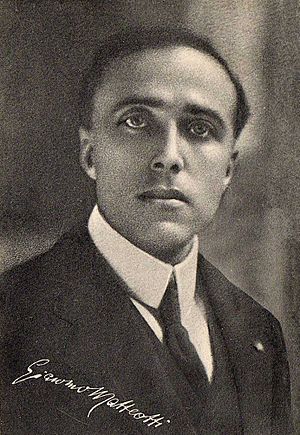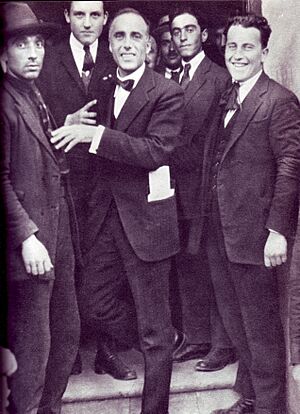Giacomo Matteotti facts for kids
Quick facts for kids
Giacomo Matteotti
|
|
|---|---|
 |
|
| Member of the Chamber of Deputies | |
| In office 1 December 1919 – 10 June 1924 |
|
| Constituency | Ferrara (1919–1921) Padua (1921–1924) Rovigo (1924) |
| Personal details | |
| Born | May 22, 1885 Fratta Polesine, near Rovigo, Italy |
| Died | June 10, 1924 (aged 39) Rome, Italy |
| Political party | PSI PSU |
| Spouse | Velia Titta |
| Children | Giancarlo (1918–2006) Matteo (1921–2000) Isabella (1922–1994) |
| Alma mater | University of Bologna |
| Profession | Lawyer, journalist |
Giacomo Matteotti (born May 22, 1885 – died June 10, 1924) was an Italian socialist politician. He was chosen to be a member of the Chamber of Deputies (like a parliament) three times: in 1919, 1921, and 1924. On May 30, 1924, he bravely spoke in the Italian Parliament. He said that the Italian fascists cheated in the 1924 election. He also spoke out against the violence they used to get votes. Just eleven days later, he was kidnapped and killed by fascists. He was 39 years old.
Contents
Early Life and Education
Giacomo Matteotti was born in 1885 into a rich family. His hometown was Fratta Polesine, which is in the Province of Rovigo in Veneto, Italy.
He studied law at the University of Bologna and became a lawyer. From a young age, he was active in the socialist movement. He joined the Italian Socialist Party (PSI). He did not agree with Italy joining World War I. Because of this, he was held in Sicily during the war.
Political Career
Matteotti was elected to the Chamber of Deputies three times. These elections were in 1919, 1921, and 1924.
He followed the ideas of another politician named Filippo Turati. Matteotti became the leader of the Unitary Socialist Party (PSU). This happened after his group separated from the Italian Socialist Party, which was more extreme.
Speaking Out Against Fascism
Giacomo Matteotti openly spoke out against Fascism and its leader, Benito Mussolini. For a while, he was the main leader of the group that opposed the National Fascist Party. In 1921, he wrote a booklet called Socialist enquiry on the deeds of the fascists in Italy. In it, he criticized the violence used by fascists.
A year before he was killed, a warning about him appeared in a newspaper. This newspaper, Il popolo d’Italia, was started by Mussolini himself.
In 1924, Matteotti's book The Fascisti Exposed: A Year of Fascist Domination was published. He also gave two strong speeches in the Chamber of Deputies. In these speeches, he criticized Fascism. He said that the recent election was not fair. He explained that there was a lot of bullying and violence from fascist groups. He declared that the election results were "invalid."
In his speech on May 30, 1924, Matteotti strongly spoke against the violence. He said that in Naples, a meeting of the opposition leader was stopped. This happened because armed groups intervened in the city. He also said that the 1924 elections were a fraud. The PNF won these elections. They won because of a law called the Acerbo Law. This law made sure the Fascists would get a majority of seats.
Some historians believe his speech was not the only reason for his murder. For example, historian Renzo De Felice suggested another reason. Matteotti had publicly criticized an alliance. This alliance was between socialist trade unions and fascist groups. Also, Matteotti found proof that Mussolini had taken bribes. These bribes were from Sinclair Oil. They were given so Sinclair could get permission to drill for oil in Italy.
Family Life
In 1912, Giacomo Matteotti met Velia Titta. She was the younger sister of a famous singer, Ruffo Titta. They got married in 1916. They had three children: Giancarlo (born 1918), Matteo (born 1921), and Isabella (born 1922).
After Matteotti was killed in 1924, his wife Velia was kept under house arrest. This lasted until September 1933. Sadly, her health suffered, and she passed away the next year. Some people who tried to help her were also put in prison.
Matteotti's son, Gianmatteo (also known as Matteo), became a politician after World War II. He served as Italy's Minister of Tourism and later as Minister of Foreign Trade.
Assassination
On June 1, 1924, the police chief Emilio De Bono ordered someone to be released from prison. This person, Otto Thierschädl, was part of the group that killed Matteotti. The order came from the interior minister, who was actually Prime Minister Benito Mussolini.
On June 10, 1924, Matteotti was forced into a car. He was then stabbed many times with a sharp tool as he tried to escape. His body was found after a long search. It was found near Riano, about 23 kilometers north of Rome. This happened on August 16, 1924.
What Happened After the Murder
Matteotti's death caused many people to criticize Fascism. Some groups even threatened a general strike. But the opposition decided to focus on showing that Fascism was morally wrong. They hoped this would lead to its downfall. However, the Fascists tried to confuse people and hide the truth. They wanted to make it seem like the issue was over.
Mussolini's government did not fall. The King also refused to remove him from power. Because of this, most anti-fascists left the Chamber of Deputies. They went to the "Aventine Mount," like ancient Roman citizens. They thought this would force the King to act against Mussolini. But instead, it made Mussolini stronger. He tried to calm things down with a speech on June 13, 1924. After a few weeks, Mussolini received support from the Senate.
The King, Victor Emmanuel III, did not dismiss Mussolini. This was because Mussolini's government had a lot of support in the Chamber of Deputies and the Senate. The King also worried that forcing Mussolini to resign might cause a civil war. This war could be between the army and Mussolini's Blackshirts.
But during the summer, the trial against Matteotti's suspected killers began. Also, Matteotti's body was found. These events made people angry at Mussolini again. Newspapers strongly attacked him and the fascist movement.
On September 13, a fascist politician named Armando Casalini was killed. This happened on a tramway. It was done by an anti-fascist, Giovanni Corvi, as revenge for Matteotti's murder.
In the autumn of 1924, some extreme fascists threatened Mussolini. They wanted to take power from him. Mussolini planned a counter-move. On January 3, 1925, he gave a famous speech. In it, he attacked anti-fascists. He also said that he alone was the leader of Fascism. He dared his opponents to try and prosecute him. He proudly said that Fascism was the "superb passion of the best youth of Italy." He also grimly stated that "all the violence" was his responsibility. He said this because he had created the atmosphere of violence. Mussolini admitted that the murderers were high-ranking Fascists. He then claimed responsibility, saying, "I assume, I alone, the political, moral, historical responsibility for everything that has happened." He ended with a warning: Italy needed stability, and Fascism would ensure it in any way necessary.
This speech is seen as the start of the dictatorship in Italy.
Trials for the Murderers
Five men were arrested a few days after Matteotti was kidnapped. These men were Amerigo Dumini, Giuseppe Viola, Albino Volpi, Augusto Malacria, and Amleto Poveromo. Dumini was an important member of the Ceka, the Fascist secret police. Another suspect, Filippo Panzeri, escaped. Only three men (Dumini, Volpi, and Poveromo) were found guilty. But they were soon released because the King gave them a pardon.
Before this trial, another trial began against General Emilio De Bono. He was the commander of the Fascist paramilitary group called the Blackshirts. But he was found not guilty.
After the Second World War, in 1947, the trial for Matteotti's murder was reopened. This time, Dumini, Viola, and Poveromo were sentenced to life in prison.
In none of these trials was there clear proof that Mussolini was directly involved.
Was Mussolini Involved?
Whether Mussolini was involved in the assassination is a big question for historians. Some historians, like Renzo De Felice, believed that Mussolini was innocent. Others, like Aurelio Lepre and Emilio Gentile, also thought he was not guilty.
A journalist named Carlo Silvestri was against Fascism at first. He strongly accused Mussolini in 1924. Later, when he joined the Italian Social Republic, he changed his mind. He said Mussolini showed him papers about the Matteotti case. Silvestri then became a strong defender of Mussolini's innocence. He suggested that Matteotti was killed as part of a plot. This plot aimed to stop Mussolini from forming a government with socialists. It also aimed to hide some scandals involving the King and an American oil company, Sinclair Oil.
De Felice argued that Mussolini might have been a victim of a plot himself. He was certainly hurt by the crisis that followed the murder. Many fascists left the Party, and his government almost collapsed. Also, his secret plan to bring socialists into a new government was ruined.
Historian John Gunther wrote in 1940 that most experts did not think Mussolini directly ordered the killing. But he said Mussolini's moral responsibility was clear. Perhaps his followers thought they were doing what Mussolini wanted by kidnapping and killing Matteotti on their own. Other historians, like Justin Pollard and Denis Mack Smith, thought Mussolini probably knew about the plan. But they believed someone else ordered and organized it.
In 1997, Mauro Canali suggested that Mussolini probably did order the murder. He believed Matteotti had found secret documents. These documents showed that Mussolini and his friends sold exclusive rights to all Italian oil reserves to Sinclair Oil Corporation. Matteotti wanted to make this public. However, a judge in 1946, Giovanni Spagnuolo, said this idea "clashes with the most elementary logic."
In May 2024, Giorgia Meloni, Italy's current Prime Minister, spoke about the 100-year anniversary of Matteotti's death. She said that Italian fascists cheated in the 1924 election and that they kidnapped and killed Matteotti.
Works
- 1924 The Fascisti Exposed: A Year of Fascist Domination
Legacy
Many monuments have been built to honor Giacomo Matteotti. One is in Rome, along Lungotevere Arnaldo da Brescia. This is where he was kidnapped and killed.
In the 1973 film The Assassination of Matteotti by Florestano Vancini, Matteotti is played by actor Franco Nero.
See also
 In Spanish: Giacomo Matteotti para niños
In Spanish: Giacomo Matteotti para niños
- Il delitto Matteotti by Florestano Vancini (1973). Matteotti is played by Franco Nero.
 | Emma Amos |
 | Edward Mitchell Bannister |
 | Larry D. Alexander |
 | Ernie Barnes |


